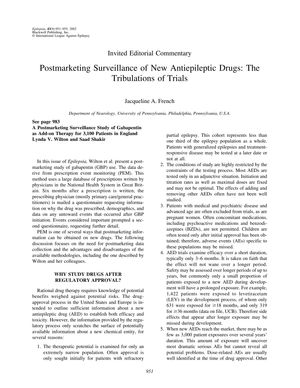Postmarketing Surveillance of New Antiepileptic Drugs: The Tribulations of Trials
September 2002
in “
Epilepsia
”

TLDR Monitoring new epilepsy drugs after they're sold is crucial to find rare and long-term side effects that initial tests might miss.
In the 2002 paper by Jacqueline A. French, the importance of postmarketing surveillance for new antiepileptic drugs (AEDs) was discussed, using a study on gabapentin (GBP) as an example. The study, which employed prescription event monitoring (PEM) within the National Health System in Great Britain, revealed the limitations of pre-approval clinical trials, such as not capturing long-term side effects or effects on specific subgroups. The paper argued that while pre-approval trials are essential for establishing initial efficacy and toxicity, they are insufficient for understanding a drug's long-term effects in real-world clinical practice. Postmarketing surveillance, including PEM, was shown to be crucial for detecting rare and long-term adverse reactions. However, the paper also acknowledged the limitations of PEM, such as underreporting, poor follow-up compliance, and difficulty in attributing side effects. The conclusion was that a combination of postmarketing tools is necessary to accurately assess the safety and effectiveness of new AEDs, as no single method is comprehensive enough on its own.